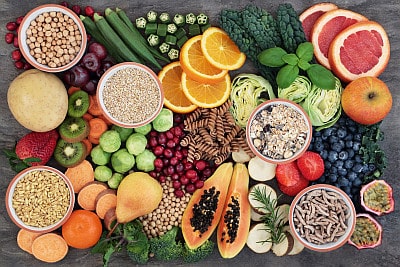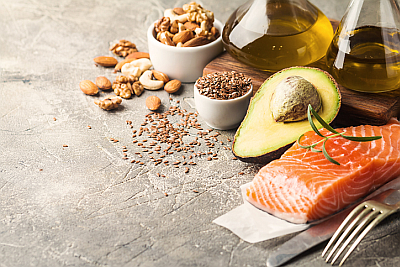Has supplement shopping left you feeling dazed and confused? If so, you’re not alone. Take a stroll down the supplement aisle—in some cases, aisles—of your grocery store or pharmacy and you’ll face hundreds of product choices and health claims.
Multivitamins, vitamins, minerals, probiotics, collagen, fish oil, biotin, melatonin, and dozens of other supplements tout benefits for supporting everything from digestive health, mood, and memory to eye health and much, much more.
Data from the Food and Drug Administration (FDA) show that there are nearly 100,000 supplement products on the market today. And the growth of this already massive category is projected to accelerate.
According to recent market figures, the supplement industry will grow over the next decade from nearly $200 billion today to almost $350 billion by 2032!

Alexa Topakas, MSCN, RDN, LDN
Adding to this confusion around variety and claims is the lack of regulation of supplements. Standardization of ingredients and quality control are left to the manufacturers.
Despite the thousands of products on the market, the FDA is not required to approve them for safety or effectiveness before they’re sold to the public. For consumers, this means it can be hard to know exactly what’s in the supplement you’re buying.
All these products and promises of better heath can feel overwhelming. Do any of these supplements really work? Do you need them? Are they safe?
Registered Dietitian Alexa Topakas, MSCN, RDN, LDN, sheds light on the supplement world to help you make informed choices.
Below, Alexa offers a big picture on supplements and later decodes some of the most common ones and what the nutrients do for the body.
The Big Picture: Multivitamins and Other Supplements
 One way of looking at supplements is to consider their name literally: They are a supplement; in other words, they are something you may or may not need to add to your everyday diet.
One way of looking at supplements is to consider their name literally: They are a supplement; in other words, they are something you may or may not need to add to your everyday diet.
For most healthy people in the US, nutrient deficiencies are relatively uncommon. According to Alexa, well-balanced meals should be your primary source for nutrition.
“For most healthy people, a diet rich in fruits, vegetables, whole grains, lean protein, and healthy fats eliminates the need for vitamin and mineral supplementation,” she says.
And if you’re thinking that a multivitamin or other supplement is an insurance policy against a poor diet, think again. Alexa warns that supplements cannot take the place of fresh, nutritious meals.
“Supplements aren’t a quick fix if you’re skipping meals or eating heavily processed foods. The best way to ensure you’re meeting your nutritional needs is by eating whole foods that are high in vitamins, minerals, antioxidants, and phytonutrients,” Alexa says.
Consuming too many supplements can even have adverse effects. You could be throwing money away or potentially ingesting dangerous amounts of nutrients.
“While some supplements can be beneficial in specific situations, excessive intake can lead to wasteful expenditure or worse: Nutrient toxicity,” she says.
Still, there are a few instances where a multivitamin or specific vitamin or mineral supplement can be beneficial. According to Alexa, these include:
- Certain Medical Conditions: Conditions like celiac disease, ulcerative colitis, and cystic fibrosis, as well as specific medications, may necessitate supplementation.
- Pre-Pregnancy and Pregnancy: Adequate folic acid intake is crucial during pregnancy to prevent birth defects. Iron supplementation may also be recommended.
- Vegans: A vegan diet might lack certain nutrients (B12, D, iron, calcium), requiring careful consideration and possible supplementation.
- Adults Over 50: Aging can impact nutrient absorption, making multivitamins beneficial. And recent research suggests a potential role for multivitamins in preventing cognitive decline.
Always consult your healthcare provider or a Registered Dietitian for personalized guidance before starting a supplement regimen. For those with diagnosed medical conditions, supplementation may be beneficial.
Regular bloodwork under the care of your healthcare provider can help determine your individual needs. If you’re generally healthy, prioritize a diet rich in whole foods instead of supplements for optimal nutrition.
Decoding Specific Supplements
Diving deeper into specific supplements, Alexa shares the latest research and separates myth from fact.
Omega-3 Fats
 Omega-3 fats are found in fatty fish (salmon, mackerel, sardines, tuna, halibut) as well as nuts and seeds (especially walnuts, flaxseeds, chia seeds), and foods fortified with omega-3s (like some brands of eggs, soy and dairy milk).
Omega-3 fats are found in fatty fish (salmon, mackerel, sardines, tuna, halibut) as well as nuts and seeds (especially walnuts, flaxseeds, chia seeds), and foods fortified with omega-3s (like some brands of eggs, soy and dairy milk).
Research shows a strong correlation between eating a diet high in fatty fish and protection from cardiovascular disease. However, many large clinical trials have not shown that taking omega-3 supplements provide the same protection.
Bottom Line: Most people should try to get two servings of fatty fish per week to get the recommended amount of omega 3s. Following the Mediterranean diet (one that includes fatty fish, healthy oils, whole grains, legumes, and fruits and vegetables) is another way to achieve a heart-healthy diet. If you are considering an omega-3 supplement, check with your healthcare practitioner as omega-3s can act as a blood thinner and interact with certain medications.
Collagen
These days you’ll find loads of collagen supplements and beverages made with collagen on store shelves. They’re typically marketed as beauty supplements for hair, skin, and nails.
While collagen is a major structural protein for these tissues and more, the research is mixed as to whether they will deliver what they promise or provide a youthful glow. Currently there are no well-designed, independent studies looking at collagen supplementation for hair and nails.
For skin, a review of nearly 20 studies found that people taking collagen supplements reported more skin firmness and suppleness. However, it was unclear if the results were due to collagen alone, as the supplements in the studies included other ingredients such as antioxidants.
Bottom Line: Our bodies can make collagen naturally, but, if you’re looking to supplement or increase collagen in your diet, consider food sources containing animal protein such as lean poultry, beef, and fish. The efficacy of collagen supplementation is still unclear.
Calcium
 Calcium is a mineral that plays a critical role in building and maintaining bone, as well as maintaining hormonal, nerve, and cardiovascular systems in the body. Currently, experts disagree about who should be taking calcium supplements.
Calcium is a mineral that plays a critical role in building and maintaining bone, as well as maintaining hormonal, nerve, and cardiovascular systems in the body. Currently, experts disagree about who should be taking calcium supplements.
Dairy products such as milk, cheese, and yogurt are ideal sources of calcium. There are also many products (juice, cereal, tofu, plant-based milk) that are fortified with calcium.
For adults, the USDA daily recommendations for calcium are:
- 19-50 years – 1,000 mg
- 51-70 years – 1,000 mg – 1,200 mg
- 71+ years – 1,200 mg
Bottom Line: Most people can easily meet their calcium needs through food. If you think you may need a calcium supplement, check with your healthcare provider.
Vitamin D
Vitamin D helps our bodies absorb other nutrients, specifically calcium and phosphorus, which are vital for bone health.
Also, early research shows a possible connection between vitamin D and protection against cancer, heart disease, and some bacterial and viral infections.
The main source of vitamin D is sunlight. Our skin produces vitamin D after sun exposure, depending on the sun’s intensity and angle. For this reason, vitamin D supplementation may be recommended for people who live in regions that receive little sun in winter—or for those who avoid the sun generally.
Some health conditions may also result in low vitamin D levels. Vitamin D levels can be measured by your healthcare practitioner using a blood test. Since this nutrient is only available in a few foods (fortified foods, mushrooms, fatty fish), your doctor may recommend vitamin D supplements if your blood test shows a deficiency.
Bottom Line: Where you live may determine whether you need a vitamin D supplement. If you live in northern latitudes, it may be worth considering supplementation with your healthcare provider. Your doctor may recommend vitamin D supplements if your blood test shows a deficiency.
Iron
 Iron is an important mineral used to make hemoglobin, a protein that helps carry oxygen to all cells in our body. Iron can be found in various sources of food. However, “heme” iron can only be found in meat, fish, and poultry.
Iron is an important mineral used to make hemoglobin, a protein that helps carry oxygen to all cells in our body. Iron can be found in various sources of food. However, “heme” iron can only be found in meat, fish, and poultry.
Heme iron is most readily absorbed in your body. If you don’t eat animal products, foods including breads, cereals, and even infant formulas are fortified with non-heme iron.
Other plant-based sources of iron include spinach, legumes, and dates. Tip: You can pair foods rich in vitamin C (peppers, cantaloupe, and citrus) to help increase the absorption of iron in your body!
While most people in the US receive enough iron from their diet, there are some groups that are more at risk for iron deficiency. These include:
- Women of childbearing age
- Infants (especially if they are premature or low-birth weight)
- Frequent blood donors
- Strict vegans
- People with cancer, gastrointestinal disorders, and heart failure
Bottom Line: Your healthcare practitioner can help determine if you are iron deficient with a blood test. Iron supplements may reduce the effectiveness of some medications, so let your doctor know what medications you’re taking.
Probiotics
Probiotics are “good” bacteria that research indicates help maintain digestive health and the immune system. Some studies show that specific types (or “strains”) of probiotics are effective in mitigating diarrhea associated with taking antibiotics. Other studies have shown that probiotics may also reduce the likelihood of getting a cold.
Many foods, including yogurt, kefir, and fermented vegetables contain probiotics.
Bottom Line: The gut microbiome is a hot topic in research currently and more research is needed. There is no recommended daily amount of probiotics at this time. For now, it’s best to look for foods that include probiotics, such as yogurt, kefir, and fermented vegetables as opposed to probiotic supplements.
Vitamin C
 Vitamin C, also known as ascorbic acid, plays an important role in many body systems, including metabolism and immunity. This vitamin is found in high concentrations in many fresh fruits and vegetables and most healthy people can meet all their needs for vitamin C through food alone.
Vitamin C, also known as ascorbic acid, plays an important role in many body systems, including metabolism and immunity. This vitamin is found in high concentrations in many fresh fruits and vegetables and most healthy people can meet all their needs for vitamin C through food alone.
Research shows that people who eat a diet rich in fruits and vegetables have a reduced risk for some types of cancer, including cancers of the mouth, esophagus, stomach, colon, and lung.
However, studies have not shown that supplementation with vitamin C can reduce the risk of these conditions. Some people take very high doses of vitamin C to prevent or treat the common cold, however most studies show that the impact on cold duration or prevention is limited.
In some studies, vitamin C supplementation shortened colds by one day. In ordinary circumstances, vitamin C appears to have little preventive value.
Bottom Line: Vitamin C-rich foods like citrus fruits, cruciferous vegetables, some melons, and berries will offer better value in nutrients than supplementing vitamin C alone. Frozen fruits and vegetables are great sources of nutrients, including vitamin C, for those who may not have readily available fresh produce.
Note: Since everyone’s health history and nutritional needs are so different, please make sure that you talk with your doctor and a registered dietitian to get advice about the diet and exercise plan that‘s right for you.

